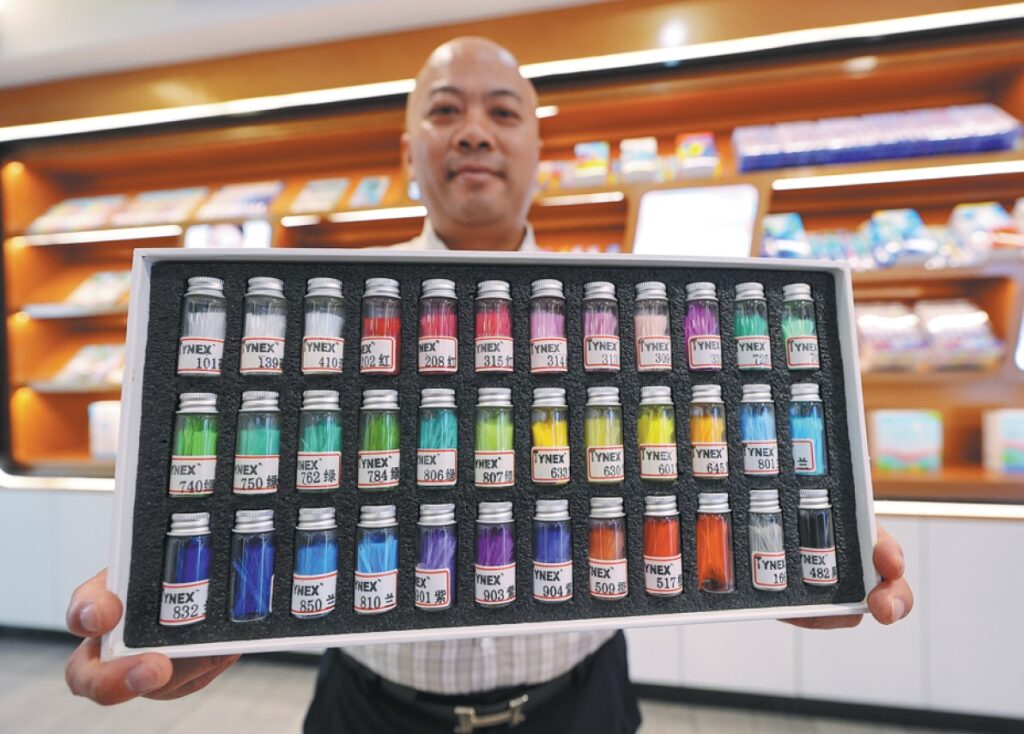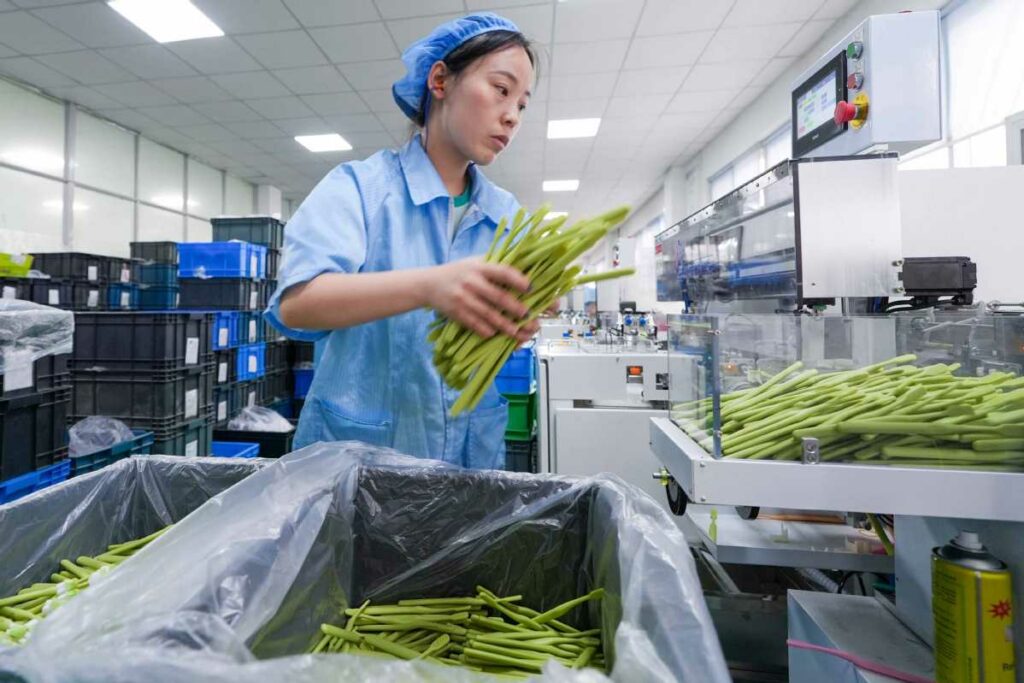
ANN/CHINA DAILY – Common, affordable and often overlooked, the toothbrush can unspool a fascinating, multibillion-dollar business tale, especially when the story is set in Hangji town of Yangzhou, Jiangsu province.
“Wherever humans reside, there are toothbrushes made in Hangji.” The engraving on a wall at the local toothbrush museum often attracts visitors’ attention. It is not a tall claim. Hangji, a small town of 40 square kilometres, makes 80 per cent of toothbrushes in China and accounts for 35 per cent of the world’s total.
The town boasts more than 2,000 toothbrush manufacturers and supporting enterprises, including famous brands Colgate, Sanxiao, LMZ and Perfect. They produce more than 7.5 billion toothbrushes annually that are sold to about 80 countries and regions. This makes Hangji the world’s largest toothbrush production base, according to local authorities.
Its journey started about 200 years ago during the Qing Dynasty (1644-1911). Back then, a local farmer, Liu Wanxing, used ox bones for the handle and horsehair for the bristles to make toothbrushes for dignitaries and nobles. He then replaced horsehair with pig bristles to largely reduce costs and sold the product to ordinary people as well. His descendants and apprentices further developed the business. And so it went on till 1976, when the first toothbrush factory was founded. After the launch of China’s reform and opening-up policy in 1978, the number of workshops once reached nearly 10,000.
These days, the penetration rate of toothbrushes has reached almost 100 per cent in China. A toothbrush costing around CNY10 (USD1.39) to CNY12 can be used for several months. This means, there is no room for significant expansion in this category. With low unit prices, profit margins also tend to be thin, like the handle of the humble toothbrush.
Yet, Hangji toothbrushes’ annual output value is CNY13 billion.

Innovative efforts
Amid rising global awareness levels of healthy and green lifestyles, characterized by aspects like oral health, Hangji started making high-end, environmentally friendly and intelligent products that have won recognition from picky clients in the Middle East, Europe and the Americas.
That is why staff members on China’s first domestically made polar icebreaker Xuelong 2, or Snow Dragon 2, use customised toothbrushes from Hangji.
“Brush bristles with a diameter of only 0.1 millimetres can better care for the gums of expedition team members in polar low-temperature environments. Additionally, considering environmental factors, brush handles produced using polylactic acid materials can biodegrade within three months,” said Li Yang, general manager of Yangzhou Sanfeng Brush Co Ltd, the producer.
Yangzhou Shuguang Toothbrush Factory, founded in Hangji about 40 years ago, collaborated with the National Engineering Research Center for Nanotechnology and Application to develop a new environmentally friendly toothbrush made from sugarcane refining residue straw, achieving 100 per cent degradation. The toothbrush is sold to dental clinics in European countries such as Germany and Sweden.
Tu Xinye, head of the factory, said its products used to be sold for CNY0.1 with low added value. It survived through large production and sales. The innovative toothbrush helped it expand to a high-end market as fierce competition marked the low-end, homogeneous market.
Oclean, headquartered in Shenzhen, Guangdong province, built its intelligent factory in Hangji. Operations started in May, and since then it has been producing kids smart toothbrushes that can play songs, remind them to brush again missed areas and provide parents with a report generated using artificial intelligence in the embedded app.
The local government has been encouraging technological innovation to drive high-quality development of the toothbrush sector.
It has multiple innovative platforms such as the Yangzhou Oral Care Products Research Institute, the Yangzhou Daily Chemical Industry Technology Innovation Strategic Alliance and the Yangzhou Hangji Creative Design Park, to provide technical support for the research and development, testing and intelligent manufacturing of new products for toothbrush enterprises.
It has introduced more than 50 leading innovative and entrepreneurial professionals at the national, provincial and municipal levels, and has applied for the establishment of 23 R&D institutions, including provincial key laboratories for enterprises, graduate workstations, engineering technology centers and engineering research centers.
In Hangji, the labor-intensive sector is also transforming toward a digitalized and cost-effective operation mode.
At the green and intelligent factory of Jiangsu Sanxiao Group Co Ltd, 150 robots perform tasks like injection molding and injection gluing.
Besides intelligent robots, the factory boasts automated assembly lines and an intelligent management system, which can operate 24 hours a day. “It can produce two million toothbrushes per day, increasing production efficiency by 50 per cent, inventory turnover by 100 per cent and shortening delivery cycles by 50 per cent,” said Han Xiaotian, the group’s executive chairman.
The project, with an investment of CNY1 billion, started operations in late December.
Complete industry chain
For Liu Rui, director of Hangji’s economic development bureau, the advantages of Hangji also lie in its complete upstream and downstream industry chains.
The Sanxiao Smart Logistics Command Center has 115 logistics companies and more than 1,000 vehicles to form a carrying capacity of 1.25 million metric tonnes in all, ensuring high efficiency in transportation.
The Jindu International Hotel Supplies City, a huge commercial complex in Hangji, is home to about 280 trading companies. Some 190 of them are engaged in the toothbrush business directly or indirectly. It has become the national trading center, information center, experience center and design center for the toothbrush industry.
In 2023, the China. Hangji E-commerce Industrial Park was put into operation, with functional areas including live broadcast rooms, unmanned supply chain supermarkets, conference and training centers, business negotiation centers, business guidance centers and internet celebrity coffee bars.
Nearly 300 e-commerce enterprises have already set up shops here or have agreed to start operations in the park. It aims to expand the market for local enterprises, Liu said.
About 25,000 people out of the 45,000 local population are involved in the secondary sector of manufacturing. Supporting companies related to toothbrush packaging, brush-making machinery, precision molds, new materials, automated equipment and other fields injects extra economic momentum into the town.
LMZ (Jiangsu) Industrial Co Ltd, headquartered in Liuzhou, Guangxi Zhuang autonomous region, built its production lines in Hangji due to its location and resources.
“The Yangtze River Delta where Hangji is located is a huge market. Our main customers, domestic large hotels such as Huazhu and Atour, all have their headquarters in Shanghai,” said Lan Jin, general manager of LMZ.
On the other hand, compared to Liuzhou, Yangzhou is closer to equipment manufacturers and raw material suppliers, and can solve everything within a radius of about 200-300 kilometres, Lan said.
Regarding raw materials, DuPont, the leading manufacturer of toothbrush bristles, has a factory in Wuxi of Jiangsu, while ordinary nylon bristles are also produced in Wuxi and Huai’an in the province, he said.
World is Hangji’s oyster
In 2003, Hangji was dubbed Chinese Toothbrush Capital by the China National Light Industry Council. Its toothbrush exports to more than 80 countries and regions account for 90 per cent of China’s total exports of toothbrushes.
A microcosm of the trend is Yangzhou Minsheng Brush Daily Chemical Co Ltd in Hangji, which exports 90 per cent of its toothbrush products.
Jia Hui, its marketing director, said its main customers are in the retail sector, such as overseas platforms like Amazon and large supermarkets abroad. Asia, Europe and South America each account for 30 per cent of its export sales, while North America accounts for 10 per cent. In 2023, its export sales reached about USD10 million.
“In recent years, market demand and our sales have been steadily increasing,” she said. “Domestically produced daily personal care products such as toothbrushes have very obvious advantages in terms of both quality and price. Besides, our industry already has very comprehensive quality standards in place, and we have always strictly controlled quality during the production process. Additionally, the industrial scale and mature supply system in Hangji make our products highly competitive in the international market.”
She said the company maintains close contact with distributors to develop products tailored to specific user profiles based on their feedback and analysis.
For example, in a certain supermarket, customers buying toothbrushes are mainly housewives from nearby communities. When choosing daily personal care products, they prioritize cost-effectiveness and tend to prefer cool colour schemes, and soft bristles. “So we develop customised products for them,” she said.
“Over the past year, foreign distributors have also felt the pressure of an economic downturn. In the past, distributors would order more products and keep some in stock. However, currently, they are basically buying as much as they sell, with minimal inventory. The procurement cycle for products has become longer compared to previous years. Nevertheless, we remain confident in the future of this market,” she said.
Yangzhou Duo Love Hotel Supplies Co Ltd in Hangji began to produce toothbrushes for hotels in 2009. It also began exploring overseas markets since 2023, eyeing Canada, Singapore and Thailand where the size of the ethnic Chinese population is substantial.
Ren Shan, its general manager, said the company plans to build branches in those countries to cut prices to benefit customers, boost demand and track market changes in time.






